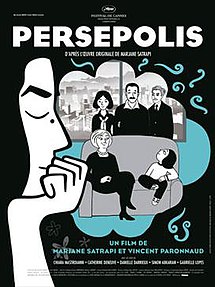 Persepolis, written by an Iranian-Parisian about her childhood in Iran to moderate, modern parents in an increasingly extremist society. Early in her childhood she is relatively free, but as regimes change and a war with Iraq breaks out, the more fundamentalist groups of Islam gain traction. As she grows up, they have to be more and more careful - wearing veils and proper clothing, what they say and how they act in public - hiding their alcohol and hosting parties with the blinds carefully closed.
Persepolis, written by an Iranian-Parisian about her childhood in Iran to moderate, modern parents in an increasingly extremist society. Early in her childhood she is relatively free, but as regimes change and a war with Iraq breaks out, the more fundamentalist groups of Islam gain traction. As she grows up, they have to be more and more careful - wearing veils and proper clothing, what they say and how they act in public - hiding their alcohol and hosting parties with the blinds carefully closed.Her parents eventually send her to Austria to finish school in more freedom, but she doesn't totally fit in there and she doesn't fit in when she gets back. After a time back in Iran, a failed marriage, and the increasing frustrations of being an artist in a restrictive society, she leaves for Paris, where the story ends.
I found the book interesting, and liked the strong, stubborn, and curious main character. She was interested in revolutionaries at the age I was still reading Narnia. She had cultural insights that I appreciated, and gave a brief overview of her country's history, which I found accessible. I liked the visual of the book - all black and white. The only thing I didn't like was the angst accompanied much of her journey. Her highs and lows were understandable for such a strong personality in such a confining and confusing world, but I found it a little off putting.
Something that jumped out at me: when she came back from Austria, she felt the divide between her and her college friends. They tried to resist the restrictions on their appearance in tiny ways - wearing subtle make-up, a hemline that showed their ankle, headcoverings that revealed a bit of hair. She thought it was partly just a game to keep women so caught up in their appearance that they no longer focused on the injustice of the many other, more serious restrictions of their freedom.
It was an interesting insight. However, perhaps in a restrictive regime, any act against it is a way to assert your individuality. But I'd agree that keeping people's attention on the petty is a good way to blind them to the larger problems.
But, I'd argue that almost everyone does that as a coping/ignoring mechanism anyway. How often do couples with issues ignore the root problems and then blow up about who should do the dishes?
No comments:
Post a Comment